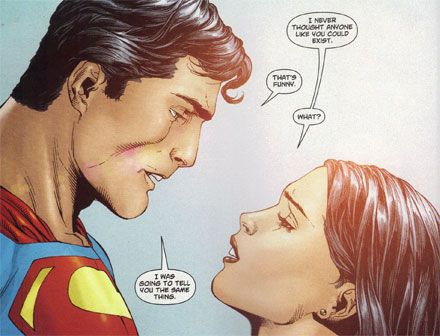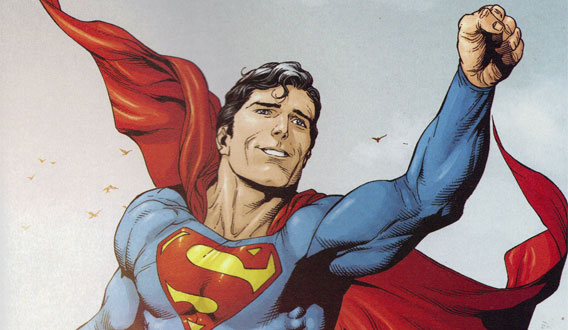This is what happens when Techland goes to the comic book store: we end up talking about what we picked up. This week, Douglas Wolk, Evan Narcisse, Mike Williams and Graeme McMillan discuss Superman: Secret Origin #6 and Namor: The First Mutant #1.
DOUGLAS: I like the team of Geoff Johns and Gary Frank a lot; I think they bring out a lot of virtues in each other. (Johns gets a very strong visual storyteller to get his beats across with maximal clarity; Frank gets a writer who can play to his knack for character acting.) If Superman: Secret Origin didn’t get up to the dramatic peaks of “Superman and the Legion of Super-Heroes”–still their best collaboration, I think–they did pretty well at putting together the How Superman Got Started story for a nice standalone volume to sell to people who want a meat-and-potatoes Superman book where Lois acts like Lois and Perry White acts like Perry White and so on. That sounds like I’m dismissing it, but I’m not: this issue was a bit of a letdown, but that’s only because the earlier ones hit their marks so deftly.
(More on Techland: The Comic Book Club: The Unwritten and Ultimate Avengers 3)
Here’s my complaint, because I am a complainer: I realize that the ultimate target audience for this thing is people who’ve seen a Superman movie and want to try reading a comic, but more than ever, Frank is drawing Superman as Christopher Reeve in a Superman outfit. In that Superman/Lois near-kiss scene at the end, the coloring approximates lens flare. Comics don’t have lens flare. (Unless their creators go out of their way to put it there.) It’s fine that Johns and Frank have made a comic book whose argument is that comics can do Superman just as well as movies; I think it makes that point pretty effectively. But wouldn’t it be more fun if their argument was that comics can do things with Superman that movies never could?

GRAEME: I have to admit, I think this trumps “Superman and the Legion,” if only because it feels to me that it is less comic-book-nerds-only, while still hitting the essential “this is who Superman is” beats at the right time. You’re right that Johns and Frank bring out the best in each other, but I think Superman does the same for both creators, as well; yes, Superman looks like Christopher Reeve, but this is the best art I’ve seen from Frank maybe ever, and Johns shines when he writes Superman. It brings out a hidden vein of sincerity and optimism that doesn’t have the “THIS IS EPIC” self-consciousness of something like, say Blackest Night or Green Lantern. Despite the scale of the plots, his Superman always feels wonderfully human to me, if that makes sense.
(More on Techland: The Comic Book Club: Wonder Woman and Action Comics)
MIKE: You think the target audience for this book is the Superman fan who is new to comics? I hadn’t looked at it like that. I took it as another “What If” story, even if this is now supposed to be the definitive origin story for Supes. I thought the whole thing was for longtime Superman fans that are well versed in Kryptonian lore. And yes, that is Christopher Reeve (if he were ripped to shreds).

DOUGLAS: Apparently the previous how-Superman-got-started book (Mark Waid and Leinil Francis Yu’s Birthright) did particularly well as a trade paperback; the question the new customer always asks is “where do I start?” Johns is a smart writer, and one of the things he’s smart about is providing an on-ramp; every time he introduces a character here, he introduces that character. I think there are a ton of Easter eggs here for longtime Superman fans, but it seemed to me like the way this one was meant to be experienced was as a book, and a book bought at a bookstore rather than at a comics store, if that distinction makes sense.
MIKE: Did you not read Birthright? I think it’s superior. And yes, buying this as a trade makes much more sense, especially considering that the shipping schedule was bimonthly at best. If I worked at a shop and someone asked me where should I start with Big Blue, I don’t know if I could have said pick up the first three issues of Secret Origin and then come back in two months.
DOUGLAS: I read and enjoyed Birthright enormously!
I mean, I’d say “just buy All Star Superman,” but that’s what I say for everything right down to “what shall we have for breakfast?”
GRAEME: To be fair, All Star Superman tastes GREAT with milk.
I really love Birthright, maybe more than Secret Origin, but I think SO feels more like a story that fits into the DC Universe as we know it, as opposed to Birthright which could’ve/should’ve been a Superman movie, divorced of everything outside of itself. I’m not sure if that really counts, its adherence to a greater continuity, but it’s definitely there.
MIKE: Well, that’s the issue, right? Isn’t Secret Origin being billed as the official story now?
GRAEME: Yeah, Secret Origin is THE ORIGIN. I seem to remember Birthright being contradicted in the regular books as it was coming out, but I may be wrong.
EVAN: The most interesting thing about this tug-of-war between interpretations of Superman is that I don’t think Johns’ and Waid’s takes are all that different. Waid leans a bit more on the lonely outsider stuff in Birthright and does a way better job of giving Superman something to pine away for, in terms of glimpsing Krypton. Johns uses Superman as someone who stands for the best of us, almost all the time.
The artists in both stories impact the way they hold up, too. Frank is just a better storyteller than Yu. And the action stuff in this issue of Secret Origin is great. You feel like Superman’s at risk here, even though you know he’s not.
Ultimately, I’d hand this to a newbie or lapsed comic reader before anything JMS has done. There is some self-consciousness in it–you can see Johns’ vision of the character peeking through when Superman speechifies–but it’s less off-model than JMS’s issues have been so far.

